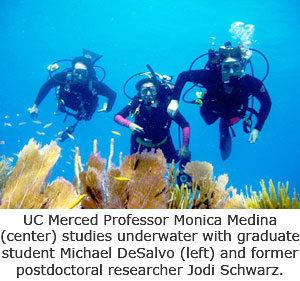

Monica Medinaand her students have recently gleaned new insight into the effect of climate change on coral reef health.
Michael Dawsonis using marine studies to learn about how environmental variation influences the distributions of genes, organisms, populations and species.
Michael Bemanstudies the ways in which microscopic marine organisms drive global cycles of nitrogen and carbon and how those cycles have been altered by human activities.
Rudy Ortizexamines how seals and dolphins internally regulate electrolytes and water and cope with natural, prolonged food deprivation to better understand hypertension, cardiovascular disease, diabetes and other conditions in humans.
Those are just a few examples of the
researchbeing done by professors in the
School of Natural Sciencesat UC Merced. The university does not currently have a stand-alone marine biology program, but that hasn’t prevented a number of quality faculty members from being drawn here, providing numerous research opportunities for graduate and undergraduate students alike.
“We’re only two hours from some of the most dramatic and well studied coastline in the world,” Dawson said. “The only universities that are better placed are a small number of our sister campuses, state universities and private colleges.”
Among the UC Merced professors studying or planning to study marine science — which also include
Andres Aguilar,
Benoit Dayrat,
Peggy O’Day,
Carolin Frank,
Michael Cleary,
Wei Chun Chinand
Ariel Escobar— Medina has garnered special attention from the National Science Foundation. In 2007, Medina received the National Science Foundation’s Faculty Early Career Development (CAREER) Award. The following year, she received the Presidential Early Career Award for Scientists and Engineers (PECASE).
And one of Medina’s graduate students, Collin Closek, was recently awarded first place for graduate research for a presentation on coral reef health at a Northern California American Society for Microbiology conference in Pleasanton.
UC Merced has always emphasized an interdisciplinary approach to research, and that is certainly the case with environmental sciences. Marine life represents one aspect of an interconnected environment, and the marine landscape lends itself to many different types of sciences.
“My research involves other aspects of science that deal with genomics, bioinformatics, physiology, ecology, evolution and cell biology,” Medina said. “I just happen to work on a marine system.”
Dawson said there are plans for an undergraduate marine biology course at UC Merced in the near future. In the meantime, there are plenty of opportunities available for graduate students like Shini Sunagawa, who came to UC Merced from Germany in 2006 specifically to work with Medina. Sunagawa said the university has been a good fit for him.
“Many of the universities in Germany are free, which is a wonderful, but it also comes with drawbacks,” Sunagawa said. “I appreciate the level of organization and attendance a student receives here. One of the reasons I came to the U.S. was that I felt here, you get better prepared for the challenges after receiving a Ph.D.”






